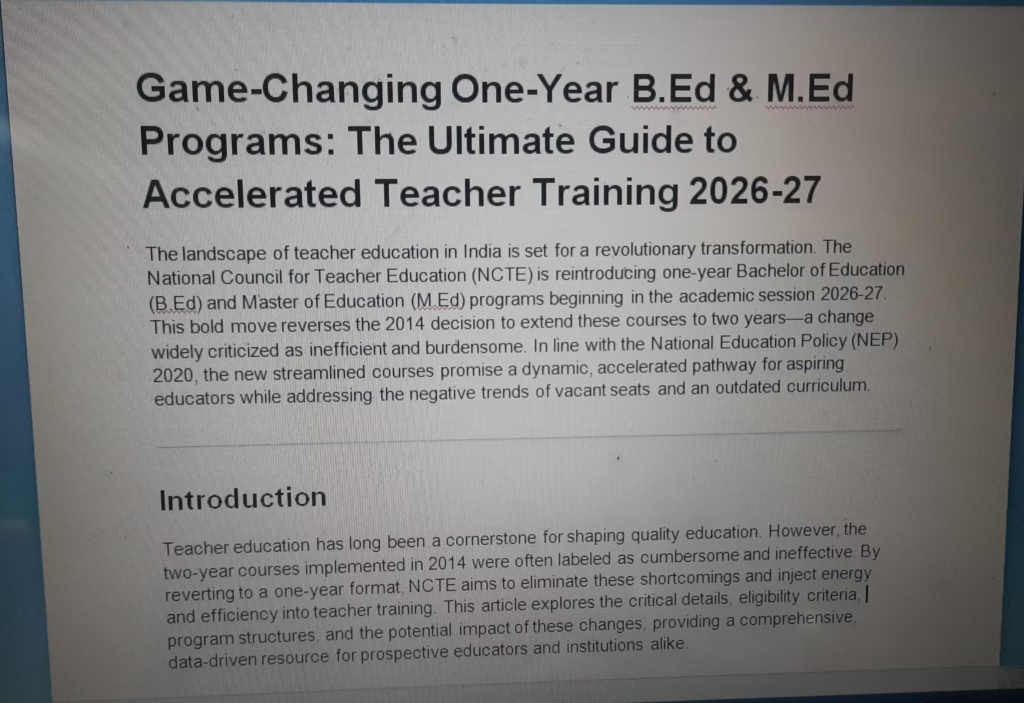Game-Changing One-Year B.Ed & M.Ed Programs: The Ultimate Guide to Accelerated Teacher Training 2026-27 NEP

Game-Changing One-Year B.Ed & M.Ed Programs: The Ultimate Guide to Accelerated Teacher Training 2026-27
The landscape of teacher education in India is set for a revolutionary transformation. The National Council for Teacher Education (NCTE) is reintroducing one-year Bachelor of Education (B.Ed) and Master of Education (M.Ed) programs beginning in the academic session 2026-27. This bold move reverses the 2014 decision to extend these courses to two years—a change widely criticized as inefficient and burdensome.
In line with the National Education Policy (NEP) 2020, the new streamlined courses promise a dynamic, accelerated pathway for aspiring educators while addressing the negative trends of vacant seats and an outdated curriculum.
Introduction
Teacher education has long been a cornerstone for shaping quality education. However, the two-year courses implemented in 2014 were often labeled as cumbersome and ineffective. By reverting to a one-year format, NCTE aims to eliminate these shortcomings and inject energy and efficiency into teacher training. This article explores the critical details, eligibility criteria, program structures, and the potential impact of these changes, providing a comprehensive, data-driven resource for prospective educators and institutions alike.
Why the Change? Positive Impacts vs. Past Shortcomings
The Positive Side:
- Accelerated Learning: The one-year courses will enable a faster transition into the teaching profession, meeting the growing demand for dynamic educators.
- Alignment with NEP 2020: The reforms reflect the NEP’s vision of efficiency and excellence in education.
- Innovative Curriculum: With components such as research, field work, and community engagement, the new M.Ed course is set to produce well-rounded educators.
- Enhanced Accessibility: Candidates with a four-year undergraduate or a postgraduate degree can now access a more efficient route into teaching.
The Negative Side:
- Concerns Over Rushed Learning: Some critics worry that reducing course duration might compromise depth, despite the redesigned curriculum.
- Transition Challenges: Institutions may face challenges in restructuring existing programs and aligning them with the new model.
- Vacancy Issues: The previous two-year courses often suffered from significant seat vacancies—an issue that the streamlined approach hopes to resolve by boosting enrollment.
Program Overview: One-Year B.Ed & M.Ed NEP
One-Year B.Ed Program
- Eligibility:
- Candidates should hold a 4 year undergraduate degree or a Master’s postgraduate qualification.
- Those with a three-year graduation degree are required to enroll in the traditional two-year B.Ed program.
- Key Benefit:
- Accelerates entry into the teaching profession for a broader group of graduates, promising a robust pipeline of educators ready to meet modern challenges.
One-Year M.Ed Program
- Eligibility:
- Open to candidates with a one-year B.Ed, a two-year teacher education program, or a four-year Integrated Teacher Education Course.
- Program Structure:
- This will be a full-time, regular course designed for in-depth specialization.
- The existing two-year M.Ed course remains available as a part-time option for working professionals.
- Curriculum Enhancements:
- New syllabus incorporating research, field work, and community engagement is in the pipeline, addressing past criticisms of a stagnant curriculum.
Data-Driven Insights: Matter Data & Key Statistics Teacher
While specific enrollment numbers and vacancy percentages have not been uniformly published, several reliable sources have highlighted that many institutions experienced high vacancy rates—sometimes up to 20-30%—with the two-year format. The revamped one-year courses are expected to significantly reduce these vacancies by offering an attractive, efficient alternative that aligns with global best practices in teacher training.
The Bigger Picture: Impact on Teacher Education
The reintroduction of these courses is not just an administrative change; it’s a paradigm shift aimed at:
- Elevating Teaching Standards: By incorporating innovative teaching methodologies and practical components, educators will be better prepared to handle modern classroom challenges.
- Boosting Career Prospects: A shorter, yet intensive, training period means quicker entry into a teaching career, addressing urgent manpower needs in schools.
- Transforming Educational Institutions: With the promise of filled seats and revitalized curricula, institutions are poised to become more competitive and forward-thinking.
10 Frequently Asked Questions (FAQ)
- When will the one-year B.Ed and M.Ed programs start?
The programs are scheduled to commence in the academic session 2026-27.
SirBikramSutradhar - What is the eligibility criteria for the one-year B.Ed program?
Applicants must possess a four-year undergraduate degree or a postgraduate qualification. Those with a three-year graduation degree must opt for the two-year course.
SirBikramSutradhar - Who can enroll in the one-year M.Ed program?
Eligible candidates include those holding a one-year B.Ed, a two-year teacher education program, or a four-year Integrated Teacher Education Course.
SirBikramSutradhar - Will the two-year B.Ed and M.Ed courses be discontinued?
No, the two-year courses will continue to be offered alongside the new one-year programs.
SirBikramSutradhar - How will admission be conducted for the one-year M.Ed program?
Admissions may be based on an entrance exam or merit, ensuring a fair and rigorous selection process.
SirBikramSutradhar - What are the key changes in the new M.Ed curriculum?
The curriculum will now include research, field work, and community engagement components to foster practical teaching skills.
SirBikramSutradhar - What advantages does the one-year format offer compared to the two-year course?
It offers an accelerated pathway to teaching, reduces the duration of training, and addresses previous inefficiencies such as high vacancy rates.
SirBikramSutradhar - Are these courses applicable to private institutions as well?
Yes, the reintroduced courses are designed to be adopted by both public and private teacher training institutions.
(General industry update based on program reforms) - How does this change align with the National Education Policy (NEP) 2020?
The move underscores NEP 2020’s commitment to quality, efficiency, and innovation in education by streamlining teacher training programs.
SirBikramSutradhar - What impact is expected on the overall quality of teacher education?
With a modernized curriculum and faster training process, the quality of teacher education is anticipated to improve significantly, addressing past criticisms of outdated teaching methods.
(Synthesis of recent education reform reports)
Conclusion
The relaunch of the one-year B.Ed and M.Ed programs marks a significant leap forward in teacher education. By addressing the negative aspects of the previous extended formats—such as inefficiency and high vacancy rates—and embracing a dynamic, research-oriented curriculum, these reforms are set to transform the teaching landscape in India. Whether you’re an aspiring educator or an institution looking to upgrade your training programs, these changes offer a compelling mix of speed, quality, and innovation that promises to drive the future of education.
Embrace this game-changing opportunity and be a part of the revolutionary shift in teacher education!
Optimized Keywords: One-Year B.Ed, One-Year M.Ed, NCTE, NEP 2020, Teacher Education, Accelerated Teacher Training, Education Reforms 2026, Innovative Teacher Training Programs, Teaching Career, Curriculum Transformation





